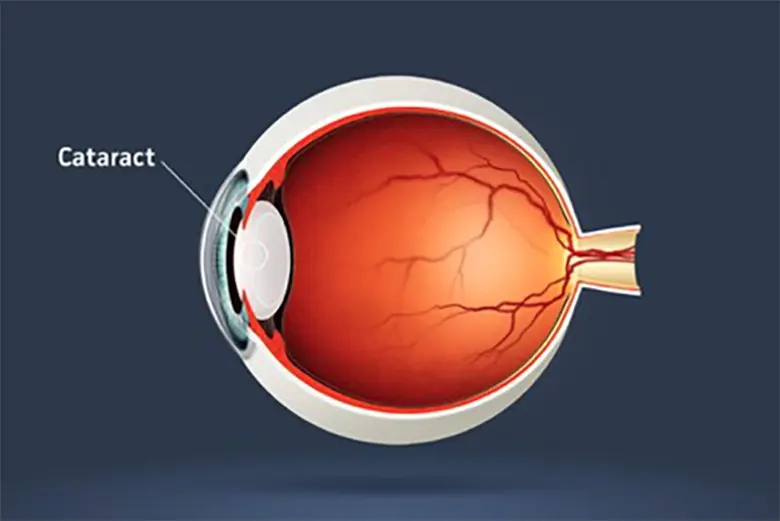What are cataracts?
Cataracts are the clouding of the normally clear lens of the eyes. Usually in the early stages, only a small part of the eye’s lens is affected and therefore vision loss may not be noted.
As the cataract clouds more of the lens and distorts the light passing through it, your vision may then start to become cloudy, with activities like reading and driving becoming more difficult.
Developing cataracts is a natural process of ageing that cannot be avoided or prevented with medicine.
What is cataract surgery?
Cataract surgery is one of the most common surgical procedures performed worldwide. It is generally considered a safe procedure with a high success rate of well above 90%.

Types of cataract surgery
There are 2 main types of cataract surgeries:
Phacoemulsification cataract surgery
Phacoemulsification is the standard method for cataract surgery and has a 95% success rate. This is still the procedure of choice and is suitable for most patients.
During this procedure, your doctor will make a small incision at the edge of your cornea to enter the eye. Ultrasound is used to break up and remove the cataract. An artificial lens will then be implanted to restore your sight. No stitches are required as the wound often seals on its own.
The entire process takes about 15 – 20 minutes and is treated as a day case.
Laser-assisted cataract surgery
Laser-assisted cataract surgery is similar to phacoemulsification surgery where ultrasound energy is used to break up the cataract. The difference is that laser-assisted cataract surgery uses a femtosecond laser to replace manual incisions for these 3 steps:
- The corneal incision
- Creating a circular opening in the capsular bag
- Making cuts in the cataract to break it down into smaller pieces
There are several benefits to laser-assisted cataract surgery, as opposed to traditional phacoemulsification cataract surgery:
- 3D imaging allows for the shape of your eye to be mapped precisely so as to create a customised surgical plan.
- The use of laser improves the precision of surgery.
- There is more precise placement of incisions and positioning of the artificial lens.
- The laser is also used to cut the cataract into 4 – 6 pieces, reducing the amount of ultrasound energy needed to remove the cataract.
Laser-assisted cataract surgery can be performed for most patients who have pupils that dilate well. It may be indicated especially for particularly complicated cases, such as when the:
- Cataract is advanced
- Cornea is weak
- Lens is unstable
Why do you need cataract surgery?
Ageing is the most common cause of cataracts which, over time, may grow larger and cloud more of the lens, making it harder to see.
Visit a doctor when you experience any of the following symptoms:
- Blurry, cloudy or dim vision
- Double or multiple vision
- Glare or halos
- Increasing myopia (short-sightedness)
- Declining night vision
What are the risks and complications of cataract surgery?
Cataract surgery is normally safe and most patients heal well with good vision. However, infection may sometimes occur and can result in poor vision. Warning signs of infection include:
- Discharge from the eye
- Increasing pain and redness of the eye
- Sudden blurring of vision
- Swelling of the eye
Some other complications are retinal tear, retinal detachment and bleeding. Retinal detachment happens when the retina, which sits all the way back in the eye, separates from the eye wall.
Symptoms of retinal detachment include:
- Feeling like there is a darkened shadow or 'curtain' over part of your eye
- Having new floating spots in your vision
- Seeing flashes of light
See your doctor immediately if you notice any of these symptoms.
How do you prepare for cataract surgery?
Ahead of your surgery, your doctor will perform an ultrasound test to measure the size and shape of your eye. This test will help determine which type of lens implant (intraocular lens, or IOL) you should get.
There are different types of IOLs with different features to suit your needs and your budget. Discuss the benefits and risks of each type of IOL with your doctor.
Your doctor may also perform tests to determine that you are physically fit to undergo surgery.
What can you expect with cataract surgery?
Cataract surgery is considered a safe procedure with high success rates.
Estimated duration
The procedure lasts about 15 – 20 minutes.
Before the procedure
To prepare you for your cataract surgery, your doctor may instruct you to:
- Not eat or drink anything 12 hours before the surgery
- Temporarily stop taking any medication that could increase your risk of bleeding
- Use antibiotic eyedrops 1 or 2 days before the surgery
- Let your doctor know if you take any medications that can interfere with your cataract surgery.
During the procedure
Eye drops will be placed in your eye first to dilate your pupil. You will receive local anaesthesia to numb the area, and may also be given a sedative to help you relax.
During cataract surgery, the clouded lens is removed, and a clear artificial lens is implanted into the empty lens capsule.
After the procedure
You can usually go home on the same day as your surgery, but you won't be able to drive. Arrange for help around home as you may be advised to restrict activities such as bending and lifting, for about a week after your surgery.
Your vision may be blurry at first as your eye heals and adjusts, but will begin to improve within a few days.
Care and recovery after cataract surgery
Recovery from a cataract surgery is usually short and uneventful. You may find yourself easily resuming your usual activities within a day after the surgery. However, you should take extra care especially during the first week after surgery.
Here are some tips you can observe to get the best recovery and prevent future complications:
- Avoid sneezing or coughing forcefully right after surgery.
- Don’t drive on the first day following surgery.
- Take the prescribed antibiotic and anti-inflammatory eye drops to prevent infections.
- Don’t lift anything heavy or perform strenuous activities for a few weeks.
- Be careful when walking around to avoid bumping into doors or other objects.
- Avoid swimming or using a hot tub during the first week after surgery to avoid infection.
- Don’t expose your eye to irritants such as dust, dirt, wind and pollen during the first few weeks after surgery.
- Don’t rub your eye after surgery.







